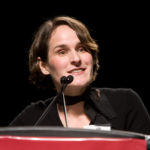Gender Ideology, the Synod of Bishops, and Feminism
December 17, 2015 | Published first in Mirror of Justice
The Final Report of the Synod of Bishops is now out — in English. Chapter One begins with contexts and challenges. The ever-encroaching threat of current gender ideology is foremost among them:
Today, a very important cultural challenge is posed by “gender” ideology which denies the difference and reciprocity in nature of a man and a woman and envisages a society without gender differences, thereby removing the anthropological foundation of the family. This ideology leads to educational programmes and legislative guidelines which promote a personal identity and emotional intimacy radically separated from the biological difference between male and female. Consequently, human identity becomes the choice of the individual, which can also change over time. According to our faith, the difference between the sexes bears in itself the image and likeness of God (Gen1:26-27). “This tells us that it is not man alone who is the image of God or woman alone who is the image of God, but man and woman as a couple who are the image of God. […] We can say that without the mutual enrichment of this relationship — in thought and in action, in affection and in work, as well as in faith — the two cannot even understand the depth of what it means to be man and woman. Modern contemporary culture has opened new spaces, new forms of freedom and new depths in order to enrich the understanding of this difference. But it has also introduced many doubts and much skepticism. […] The removal of the difference […] is the problem, not the solution” (Francis, General Audience, 15 April 2015)….
[And then later in the document] Christianity proclaims that God created humanity as male and female, and blessed them to form one flesh and transmit life (cf. Gen 1: 27-28; 2, 24). Their difference, in equal personal dignity, is God’s seal of goodness on creation. According to the Christian principle, soul and body, as well as biological sex (sex) and socio-cultural role of sex (gender), can be distinguished but not separated.
Statements like this are desperately needed as our post-Obergefell culture swims faster and faster toward gender [strike that – sex] oblivion. The ideological march toward the fringe of the feminist and gay rights movements (a fringe that tends toward obliteration of the very identity of the category of persons whom these movements represent) is fast approaching. A recent piece in the New Yorker on the creator of the popular tv show, Transparent, is indicative–and frightening.
If trans people are scapegoats for the right, they are also requiring the left to undertake a momentous shift in thinking. “We’re asking the whole world to transition with us to a less binary way of being,” Drucker said. “It’s the next step in the fight for gender equality: removing the habit of always qualifying a person as a man or a woman. If we start thinking of each other as just people, it allows us to identify with each other in a way that has never really been possible before.” …In the utopia that [Transparent creator] Soloway envisions…there would be no need to transition, because there would be no gender in the first place. Soloway parsed it differently: “In a few years, we’re going to look back and say, ‘When we were little, we used to think that all women had vaginas and all men had penises, but now, of course, we know that’s not true.’”[And in conclusion, the admission of the spiritual “obsession” of this quest:] I’m obsessed with that part in the Bible when Jesus is given the opportunity to cure a person possessed by demons, and Jesus says, ‘What is your name?’ And the person replies, ‘My name is Legion.’ Whatever is not normative is many.” She liked the idea of a person containing more than one self, more than one gender.“Part of it is just the fiction of being alive,” she said. “Every step, you’re making up who you are.”
Though feminists are certainly a diverse bunch, this fast-moving ideological current is due to splinter feminism further–much like abortion did in the 1960s and 70s. Feminists for Life, founded by estranged members of NOW, might well need to be joined by Feminists for Women, an organization that would hold fast to the now controversial position that women are women–and that biological differences (asymmetry) have something to do with it. Here’s my utopia: that Feminists for Women would recognize that they really ought to be Feminists for Women for Life because it was that move–acceding to a male-normative view of equality by agitating for abortion–that brought us down this dark road in the first place. And do note: the pressure the LGBTQetc community has put on the culture to accommodate–no, force a transition to a “less binary way of thinking”–has shifted the properly feminist focus away from the central concern of the vast majority of women today: how to both contribute to the world of work while prioritizing care for their children. The trans focus has been a major loss for women and for children. Kudos to the bishops for speaking the truth.



